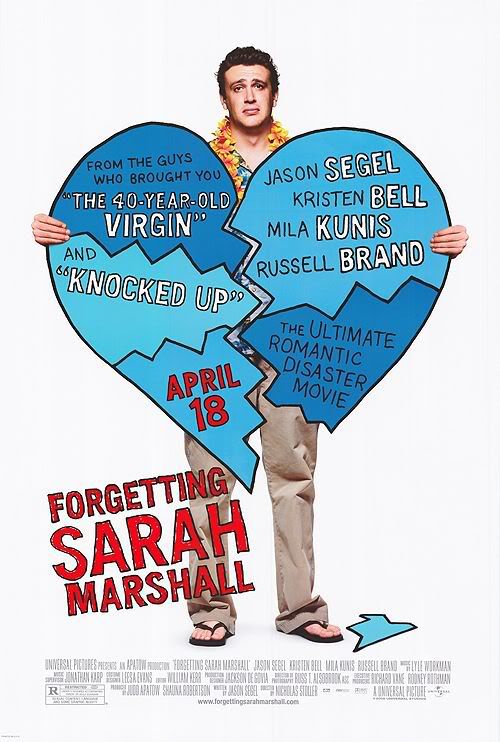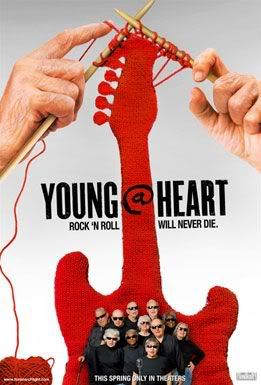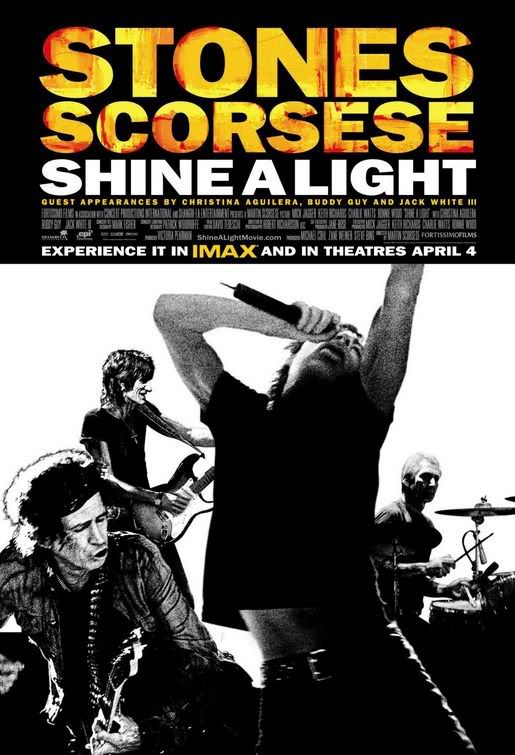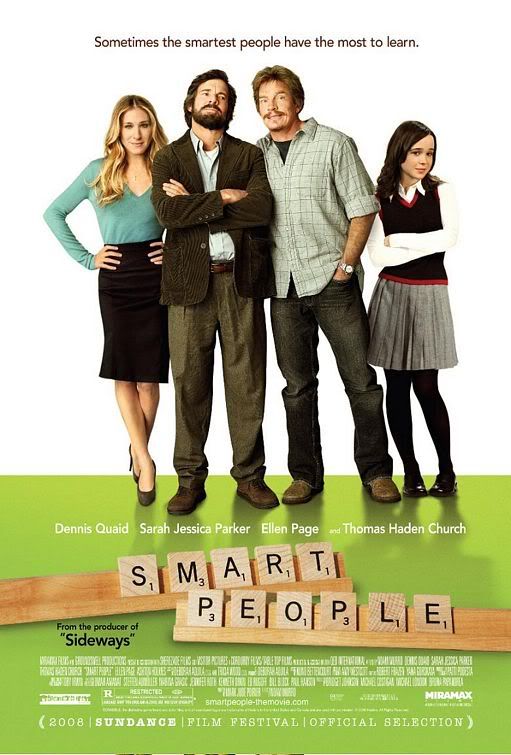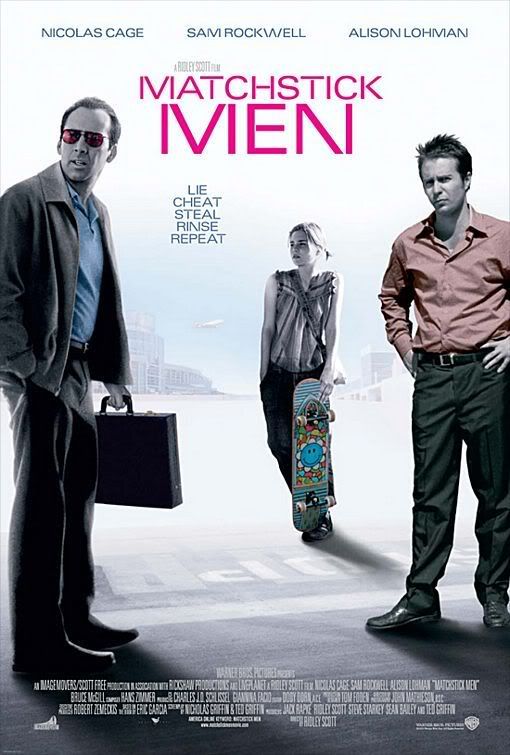
The following posts several spoilers for "Matchstick Men," and big plot devices will be ruined if you read this without having seen it.
Tonight I watched "Matchstick Men" for the first time in about a year and a half. I've seen the movie easily over ten times before-and I declared it the best film of 2003 that year. I find all aspects of it criminally underrated-from the masterful performance of Nicolas Cage, to the terrific direction of Ridley Scott. Despite directing many big movies between this and "Blade Runner," I find it to be his best work.
But of course, hardly anybody agrees with me on this assessment. And even almost five years later, "Matchstick Men" hardly gets any credit and it seems to just float there, despite me still seeing the greatness that I discovered a while back.
To just put some plot down if you are reading this without having seen it-something that I will not suggest, but after this plot summary I will suggest you stop-"Matchstick Men" stars Nicolas Cage as Roy Waller. As a con man, Roy is quite good at it. Doing it for years, and having accumulated over a million dollars in his safe deposit box, Roy has reduced him and his partner Frank (played by Sam Rockwell) to small time con-talking people into buying something worthless and then taking them for all they've got. It's in his normal personal life where Roy is failing-ridden with various tics and twitches, Roy cannot go into a room without opening the door three times, and he does not tolerate shoes on his carpet. Taking some kind of illegal pill to calm his nerves, Roy's life turns upside down when he spills his remaining pills down the drain. And his source has packed up his things and moved back East. Roy begins to see a shrink, the calm and soothing Dr. Harris Klein, who Roy reluctantly warms up to and confides it. In their sessions he begins to think about his ex-wife Heather, and the fact that she was pregnant when he left her. And put into contact with this daughter that he learns he has, Angela (played by Alison Lohman), Roy meets her, under the ruse that he is an antiques broker. This comes at the same time that Roy and Frank decide to con Chuck, a rather sleezy and greedy businessman, in a con involving currency exchange.
What happens here is that we have three stories running parallel to each other, before merging in ways that are unexpected. We have Roy with his obsessive compulsions, battling his own inner demons as his world changes around him. The thing is that we do not know what is actually bothering Roy. It's been fourteen years since he left his wife, and in that span of time what occurred to bring him to this fragile mental state. It doesn't really matter, because Nicolas Cage sells this role with expertise. We are able to believe his compulsions without actually knowing the cause of them.
Our second story is the one between Roy and Angela, and the bond that they form. This is clearly the real core to the story, as the only times that we see Roy actually ease off his twitches is when he is with her. Three scenes can be mentioned here. The first is when he agrees to open up to her about what he does for a living. Sitting on the floor over a pizza he tells her what he does, and this is the first scene where his eye remains mobile for the entire time. In one of the best scripted exchanges in the whole movie we actually get a glimpse at what could be bothering him-he's sick of his work. He has to con people that do not deserve it-"old people, fat people, lonely." In a sad voice Angela asks why he does it, to which we do not get an answer. But we don't need one either. The second scene is while bringing her out onto a job, teaching her a minor con involving a lottery ticket and a woman doing her laundry. And lastly is really a stretch of scenes throughout the movie. Notice the windows in the car in three scenes where Cage is waiting for his daughter. Before their meeting the window is closed up-the smoke from his cigarette fills the car in sickly fashion. While waiting for her to get out of summer school, the window is opened almost halfway. And a scene at the end where he begins to tell her his plans for gaining custody, the window is practically open all the way.
The final story is the con itself-the con that Roy and Frank begin to play on this Chuck. Oddly enough this is really the least important aspect of the film, even though the final twist in the end (which I will get to later) really does incorporate all three storylines into one. On the surface this con would really just seem central to keeping the story entertaining-which is does. In fact, the whole movie is entertaining enough to keep watching simply because of the way it ebbs and flows among all three of these stories. It never lets go, because all three storylines just fit so gently into one another.
These are all observations that I have made before, the other dozen or so times I've seen this movie. Watching it this time, with a new context that I have made for myself, I began to notice more. When I first saw this in 2003, I paid attention to story not expecting it to be as masterful as it was. Five years ago I paid most of my attention to script and acting, mainly because of my interest in writing at the time. Yet over the past year or so I have been intriqued by so many different aspects of film making-mainly cinematography and sound. I've been impressed by the look of things like "Children of Men" and "There Will Be Blood," mainly for the scope of their shots. Both include such terrific long shots. And for sound, especially in last year's "No Country for Old Men," which relied on sound for tension since it only had about a minute of music throughout its entire running time. This time I watched the film with this is mind-not having to concentrate on the performances and the script as much simply because I've poured my obsession over them for the last few years.
Ridley Scott simply scores with every single trick that he does here. I have not been impressed by any of his recent works-"American Gangster" and "Kingdom of Heaven" both missed the mark by large amounts. However, but working on a smaller scope and yet having an epic feeling, he is able to focus on a smaller scale. You are uncomfortable watching this film in the first twenty five minutes or so. There are quickly edited shots, following a very quick rhythm. A scene where Roy calls his pill provider and learns that he moves involves so many cuts. Roy in the middle of the screen, and the camera cutting from his left profile to his right profile very quickly-at least eight shots were in a period of ten seconds. The shots do slowly get longer, and although not shots in the film really does last for longer than twelve seconds (I didn't time it, but this is just an educated assessment) it just hints further that Roy (the character we follow in every single scene of the narrative) never does fully get better, but better enough to function and come to terms with himself. As he says in the final scene of the movie, when all is said and done, "I see things differently now," and as the viewer we seen things differently in almost every scene.
I've always been a fan of the Hans Zimmer score-which combines a jazzy sound with a rather offbeat and quirky rhythm-but I paid more attention to the actual background sound, which was very apparent on the big screen that I watched it on and with the sound up very high, something I haven't experienced from this movie since seeing it in the theatre. There is an almost trancelike feeling you get while listening to this movie. A scene where Roy is trying to comfort Angela after she storms out of his house after they fight has them outside-there is no music, but there is plenty of tension because of the background noise that Scott decides to fit into the soundtrack. She asks why he has a gun, and at that same second you can hear a train whistle in the background. Perhaps a train just passed by while they were filming, or maybe its a mere symbol for Cage's desire to get away from the moment-it is time to confront an issue that he has been trying to skirt since meeting Angela-an issue that perhaps he's been trying to skirt himself. Conning is something that he is good at, even though its killing him to do it.
And lastly the pool. Roy has a pool in the back of his house-an in ground small pool that is never used, and only seen in one scene up close-where the ever obsessive Roy goes out of his way to get out of a leaf from the center, which he throws into his sink to dispose of to avoid mess. The rest of the film features the pool as a reflection over the characters, making it a character itself in a way. A scene where Chuck-after finding out that he's been conned by Roy and Frank-holds them up in his apartment one night has literally no indoor light, and the only light we see is by the blue of the pool, which cascades gently over the four people in the scene. And it all just leads more to the tension of the scene-there is plenty that we do not see here, and we just want the water to flow just a little bit more off the screen for us to see what we want. It's wonderfully shot and directed, just the whole way through.
I have been thinking about the pool and why it is there. This could be a stretch, but Roy is stuck in his house-he doesn't like to leave-and meanwhile there is this flowing pool, with water that is constantly moving out in the open. The only time Roy physically interacts with the pool is to get a leaf out of it that falls inside-it's a rather comedic moment in the film. The rest of the time its just there reflecting Roy's actions as he wanders around his home with not much to do. And I wonder if there is any connection to the fact that Roy only eats canned tuna fish-another example of a trapped sea creature. But that could be stretching it a little-as is the wonder of film.
What makes "Matchstick Men" so successful, in addition to these elements I listed on the more technical standpoint, as the points that I mentioned already-the acting and the script. All of the three central actors give fantastic performance, especially Cage-and this is his best work in years. This was during the Golden Age of Cage-this followed the great "Adaptation," which was then followed by "Lord of War," and "The Weather Man." Here he just weaves perfectly from his more dark days to the light ones-and after seeming to be finally gaining some composure, right after the con goes wrong and his life falls apart again-his relationship with Angela dies for the time being-he lays there on his couch in disarray. He runs out of pills once more, and in one of the best scenes in the entire film-both written and acted-he runs to a pharmacy to try and restock on them. This change is very sudden-he makes a one hundred eighty degree switch from how he acted only five minutes before-and yet it just fits in so perfectly, as Roy never was fully cured anyway.
The supporting work by Sam Rockwell is very good, as Sam Rockwell always is, even though I still haven't exactly discovered the strong depth with the Frank character as with the other two. It's somewhat hard to approach Frank, as in the end-with Frank, "Angela", Klein, Chuck and a few others-end up conning Roy for all he's got-minus a small "gift." Simply put, Frank is playing Roy the entire time. All of the little acts that he does that seem to help Roy-including putting him in touch with Dr. Klein-seem like he is helping him, but he is just laying the groundwork for the big con. I would like to watch the film once more, focusing entirely on Frank the times that he is on the screen-just to watch his relationship with Roy from the standpoint of him simply as a mark and not really as a friend. Although Frank does see Roy as a friend, he is a mark first.
And lastly there is Angela, played perfectly by Lohman who doesn't appear in enough films. What makes this such a complex character is that she is a twenty something year old playing a fourteen year old who is really a twenty something year old playing a fourteen year old-if that makes any sense at all. Looking at some other roles of twenty somethings playing teens-namely the recent "Juno,"-Lohman does this with a more natural appeal. I understand that the final con at the end really does put a spin on the way all the characters act throughout, but putting that aside she really does allow up to buy into it all. It is with this ease that makes the movie believable, and even though many will figure out the final twist at different times, her work here really does allow the viewer to not realize it until much later than it could have been. And there are the complexities to her character that really are hidden-once again she is seeing Roy as a mark before really seeing him as a fatherly figure, which explains why she does not continue conning people during the one year later segment at the end of the film. She is settling down-maybe not with the most sharpest guy in the world-but she is still settling. Once again, we do not know anything about Angela's past-we don't even find out what her name is-but as Roy puts it as the last words of the film "I know your name." And this is where Roy's influence over Angela really does come into strong focus, and it is an angle I would like to watch this with in the future.
And lastly Ted Griffins script is just so wonderfully written-in exchanges between the characters (especially some of the witty banter between Roy and Frank, which is needed in buddy con films like this) or just in structure and narrative, every scene is needed and important, even if during the film you don't think it might be. There is a certain flow here-the movie reveals its surprises when the audiences attention begins to wan, sucking you right back in. It doesn't seem at all fast paced or slow paced-it just fits right in. An extended moment between action sequences involving Chuck contains more quiet sequences between Roy, Angela, and Frank-we see Roy and Angela out to dinner and dancing at a Spanish restaurant, and its then when you somewhat are ready for more-which is exactly what Ridley Scott gives there-more. And the final twist, which many disliked upon its release, is really just the icing on the cake. Yet it isn't a sad film, despite Roy loosing everything that he had, and everything that he thought he had. It's puts life into perspective-the con job is what was doing this to him. He is now able to sit down and relax-he gets a legit job (at a carpet store in an ironic twist of fate), he married the woman at the grocery store that he casually flirted with through the film, and he is actually having a child now. And yet, in a perfect moment by Scott that is there for you to discover instead of being highlighted to death, Roy gives a slight twitch as the movie fades out. A wonderful last touch.
As for the twist ending-the entire thing being a con to get Roy's money-all I can do now is notice the clues that Scott provides for us throughout. I watched a documentary on the DVD for the film, which shows clips that were in the original cut that Scott took out. Short little tiny moments that could reveal too much. For example, a glare between Frank and Angela while Roy's back is turned in a pivotal scene in the film. These were all taken out, but there are plenty of little touches. As Roy says to Angela during his little training for her con, "Ninety percent of this game is variable. You have to be ready for anything." And you can somewhat see Frank's big con change throughout. When Roy starts to see Dr. Klein, you can see him manupulating him trying to extract information. He asks how old his child would be, if he had a child, just to make things go smoother. It is him who even tells Roy to be honest and open with her-in a line that makes you know that Klein doesn't have any children of his own. "They are not difficult kids. Just make sure they eat their vegetables, don't stay up to late, don't watch too much TV." For Cage, wrapped in his own little world at the moment, he doesn't notice the odd line that he says here, for there is certainly more with kids than just that. But for the viewer, it's a small mental note. How Klein passed through Cage's real question and just made it about getting the information that they need to rob him dry.
I'm not exactly sure what my point is. I suppose I just wanted to revisit the movie through words instead of just watching it and moving on. My opinion on the film has not changed, it has only deepened. No film entertained me more, made me think, and just made me realize the talent of everyone involved as this one. It's clearly ingenuis, and should have been nominated for all major awards that year-but it was the year of "The Lord of the Rings," so its chances were very slim from the get go. And yet it is a masterful movie-masterfully directed, written, acted, and even masterful from the various technical aspects. I love this movie, and my desire to write such a long and perhaps winded essay on it really must highlight it. I really look forward to seeing it over the years, and just hoping that it finds it momentum one day.
Final Grade-as if its needed
"Matchstick Men"-**** of ****
